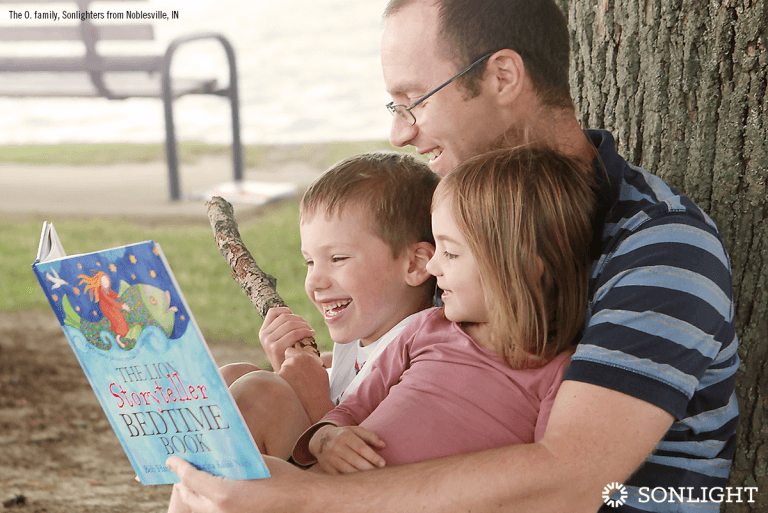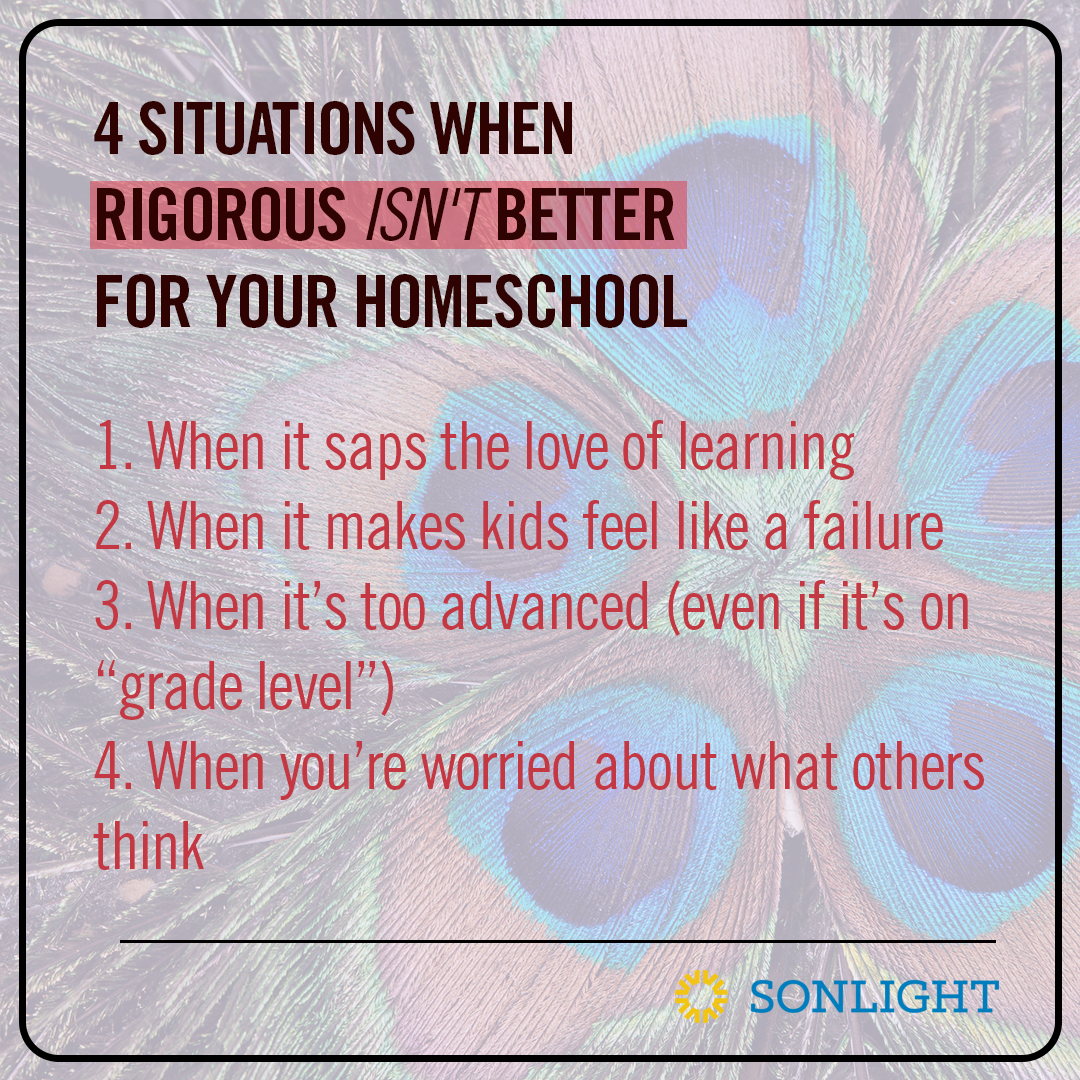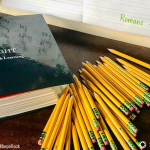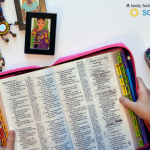
He looked up at me with tears streaming down his face. He threw his pencil on the table in frustration. He had been trying, but it just wasn’t working. He was done, and I was done. We were both defeated.
It was at that moment I realized that a rigorous education isn’t always a better education.
My youngest son came to us through adoption. A product of a broken home, an absent father, and a mother in and out of jail, our son was broken. His spirit was broken, and I was pushing him academically as if he were whole. It was a prime example of when rigorous isn’t better.
My education philosophy changed the day my son’s tears spilled over his arithmetic paper. I realized that not every student—or every season—is made for a rigorous education. Although I want the best education for my children, there are four situations when rigorous is not the best choice.
1. When It Saps the Love of Learning
I’m not sure that my son had ever experienced a love of learning. His seven short years were full of survival instincts. I not only needed to make sure his education didn’t dampen his love for learning, but I needed to help him discover his love for learning.
Children need opportunities to be amazed by the world around them—to be given material to pique their curiosity and spark the desire to learn.
When your child isn’t seeing the wonderment of learning because you are pushing too hard, rigorous isn’t better.
2. When It Makes Kids Feel Like a Failure
I believe that children learn valuable lessons from failure, but I also think that our children need to feel more successes than failures. We need to be sure that our kids are building confidence in their ability to learn.
If they experience failure after failure, they will eventually stop trying.
My son needed me to build his confidence more than he needed me to teach him arithmetic. After the trauma of his early years, he needed to feel valued and believed in.
When your child feels like a failure in school, rigorous isn’t better.
3. When It’s Too Advanced (Even If It’s On Grade Level)
Sometimes children aren’t developmentally ready for concepts, even concepts that are considered “on grade level.” In this case, it doesn’t pay to forge ahead regardless of your child’s readiness.
My oldest son has dysgraphia, and I had him begin learning cursive in third grade because that’s what third graders do. It turned out to be an agonizing thirty minutes of tears and whining every day until I realized that I didn’t have to put him through that. Instead, we got him help from an occupational therapist. After his years of OT exercises, finally in fifth grade, he was ready to learn cursive. Now, he prefers writing in cursive. However, if I had ignored my child’s signal that he wasn’t ready, I would have caused unnecessary pain and a permanent distaste for cursive.
When you’re requiring your child to do advanced work when your child isn’t ready, rigorous isn’t better.
4. When You’re Worried About What Others Think
The friendly neighbor or stranger in the grocery store starts musing and then directs his question towards my child, “Oh, you're in fifth grade huh? Let’s see, I bet you’re reading big chapter books and working on fractions and division, right?” I’ve endured it more times than I’d like to count.
A well-meaning friend or stranger finds out you’re homeschooling and slyly tests your child to see if they are keeping up with public school kids. Your friend whose kids go to an elaborate co-op with tons of reading and memorization may raise her eyebrow at your enjoyable Read-Alouds and slow pace through a math program. Your teacher friend at church questions if your kids are "on track."
Hey, if you’re a homeschooler, I know you’ve heard it too. The question is how do those comments affect your homeschool? If you are worried about what others think, you might be tempted to present a rigorous education just to keep up appearances with others.
If impressing others is your motivation, rigorous isn't better.

Children should be challenged to stretch themselves. When we have high standards for our children, they will typically rise to meet the expectation.
And some children are voracious learners, devouring reference books and biology experiments in their spare time. They will thrive under a rigorous education and should have the benefit of all the enrichment we can offer them!
So here’s the thing...a rigorous education is great if it fits your child and the season of your child's life. But there are situations when a rigorous education is not better. It's up to you as the parent to decide if your child needs a more relaxed pace or more rigorous one. If the four situations above don't apply to you and your child is thriving under the rigorous route, super! But if your child is floundering, take this article as permission to slow down and back off for a more gentle education at least for a season.
Sonlight can be as rigorous or as gentle as you like, depending on which program you chose and how you schedule it. Talk to our Advisors to make an educational plan with the perfect level of rigor.









Thank you, thank you, thank you for this!!! This article resonated. My youngest child left his year in public school emotionally bruised and feeling like he was stupid and couldn't learn. Our first attempts to try to "catch him up" that summer after Kindergarten, before we decided to homeschool, were filled with 20 minutes of crying while we hugged and encouraged our child to try to sound out words in a simple reader. It's why I choose a gentle homeschool schedule over rigor. And it's why I CRINGE when I hear the term "rigor" applied to preschool and kindergarten.
My other two kids though, thrived in the same school that crushed my youngest (and it wasn't that the teacher was doing anything unusual, or was mean...my youngest actually loved his teacher). But having one who didn't thrive made me rethink the need for a gentle, un-standardized introduction to school that allows kids at least a little time to go at their own pace. Schools like Waldorf school in England, and the public schools in Norway, go at a gentler pace (not even teaching reading formally until age 6 or 7, in stead of age 5 like we do here)...and they don't suffer at all for it in the later grades.
Children first testing the educational waters should be encouraged and allowed to go as fast as they can and learn as much as they want to, but I fear that the PUSH to get kids to all children to learn to read earlier in schools is not based on the child's needs or what they are developmentally ready for, but other factors like "how the school looks in test scores."